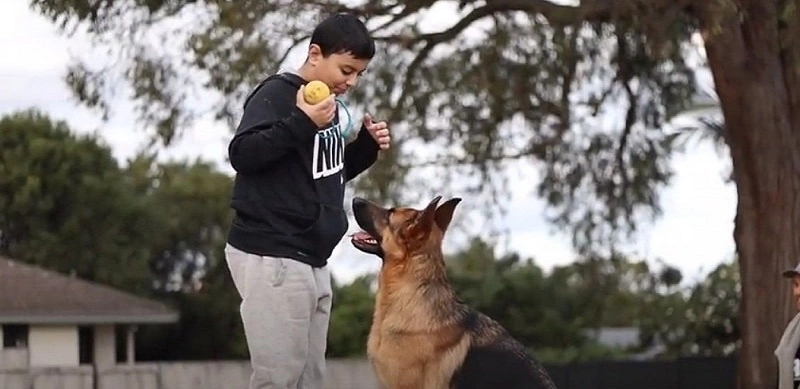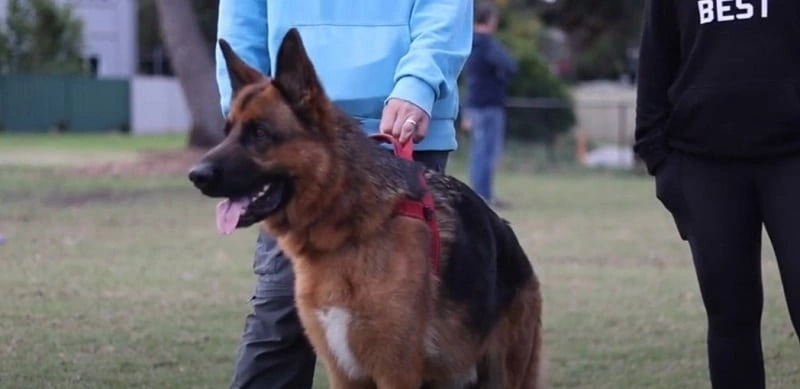German Shepherds were initially bred for herding sheep and not for aggression; however, many GSDs have aggressive tendencies that need to be controlled. These dogs need a knowledgeable owner who can bring out the best in these dogs. With the right training, GSDs can be magnificent family dogs.
German shepherds are safe around kids. If appropriately trained from puppyhood, this breed can be patient and gentle with small children, infants, and even newborn babies. GSDs soon learn to bond with the children of the house, and they can be pretty protective of them.
Any dog can become dangerous and unsafe for families. However, German Shepherds have so many excellent personality traits. It’s worth knowing what to look for in a German Shepherd before bringing one home to your family.

Table of Contents
Are German Shepherds Good Family Dogs?
German Shepherds are good family dogs; they are one of the most popular dog breed choices for families. They are famous for their intelligence and trainability, and they are energetic and sporty, making them an ideal choice for active families.
While it’s essential to have a well-bred, adequately trained German Shepherd, you must teach your children to respect the GSD, and you must teach the GSD to respect the children. Only then can a German Shepherd make an excellent addition to your family.
This breed has a history of tolerance and patience, qualities that any family would seek in a pet. Be aware that GSDs, while loving to their families, can be aloof with strangers, so don’t expect this breed to be outwardly friendly towards people outside of their family. Some owners desire this quality in a dog; GSDs are the ultimate guard dog.
Large dogs are usually better than small dogs for families of small children, mainly because the GSD is less likely to get injured if accidentally tripped over or stepped on.
Understand that many issues between children and GSDs arise when neither understands the bodily cues of the other.
For example, small children get too excited and move about quickly and unexpectedly while screaming in high-pitched tones. GSDs might think that this is an invitation to play when the child interprets the dog’s interaction as a frightening event.
Consider the following safety issues when bringing a GSD home to your children:
- GSDs like to lick children’s faces as a sign of affection, but this can increase a small child’s fear.
- An innocent game like tag can end up with a child getting knocked over. If your child cries, the dog could interpret this as an invitation to play, worsening matters for your child.
- GSDs are active, and like jumping, small children and infants are easy targets for accidental knocks during excitable greetings.
- You need to supervise all interactions between children and German Shepherds to avoid any misunderstandings.
- Even children who are not usually afraid of large dogs need constant supervision around them.
Are Male Or Female GSDs Better With Families?
Either a male or female GSD can be perfect for your family. However, females are typically better suited to families with young children.
The reason females are better for children because they are maternal towards children, not as territorial, dominant, or as aggressive as males. They are also not as protective; this can be a good quality, but it can also get out of control.
Female GSDs are friendlier, sweeter, gentler, and more patient with children than male GSDs and interact better with them overall.
Male GSDs are more muscular and larger than females and can overpower children. Their dominant behavior may push around the kids, and they have more aggressive tendencies.
Both Male and female GSDs will alert their family to danger by barking loudly; this makes them excellent watchdogs. However, males being more aggressive and dominant than females may escalate their protectiveness over their families.
This is when problems can ensue. Male GSDs are generally best suited for single people or military and police roles, whereas females are best suited to families.
The gender of the dog aside, the best dog for your family is one who doesn’t simply tolerate children but one who loves children.
You must also consider the age of the German Shepherd for your family and whether a puppy or adult GSD is suitable for children.
GSD puppies are a lot of work! If you have pre-school-age children, it would be best to delay getting a puppy until your youngest child is at five years of age.
People automatically assume that choosing a puppy for a young family is the safest option, but this isn’t always the case.
Puppies, even GSDs, are fragile and need more time and care. They are also prone to biting, jumping, and scratching, so neither the children nor the dog is safe.
If you are busy and can’t provide suitable training for your active breed, then a puppy isn’t the best option for you.
The best choice of GSD for your family is a known child-friendly adult dog who previously lived with kids. The rescue shelter or previous owner should inform you that their GSD is child-friendly.
In addition, this dog should be well-trained, socialized, and a great dog to be around your family.
Socializing A German Shepherd

Socializing a German Shepherd should begin the day he is born. An experienced breeder will understand the importance of socializing and handling their litter. By eight weeks of age, a GSD should ideally be handled by a minimum of 100 people.
When you bring your GS puppy home from the breeder at eight weeks old, you must continue the socialization process.
The socialization window continues until your puppy is around four months old. You should carefully introduce your puppy to many people, objects, locations, sounds, and experiences during this period. You should ensure that your German Shepherd grows into a well-adjusted, happy, and trustworthy adult dog instead of an angry or quivering mess.
Dog behavioral experts agree that the socialization period for puppies is pretty short and usually comes to an end by about fifteen weeks.
However, sensitive breeds like the German Shepherd need gentle introductions to new experiences, people, and pets. Therefore, socialization could go on for two to three years with a GSD.
If you are wondering how to socialize your German Shepherd puppy, consider the following short checklist of exercises to complete with your new pet:
- Approach many children of all ages and get them to offer your GSD a treat
- Approach many men and women and have them offer treats to your GSD
- Approach numerous people in wheelchairs, canes, and other walking aids, people in costumes and have them offer treats to your GSD
- Frequent car rides to locations other than the vet’s clinic
- Engage in resource guarding prevention training
- Engage in handling exercises
- Expose your GSD to various surfaces (concrete, grass, tiles, wood floors, carpets, etc.)
- Expose your GSD to livestock from a safe distance
- Bring your GSD to a dog park and encourage him to play with other puppies and dogs known to be safe.
- Crate training
Behavioral Training For A German Shepherd
It’s essential that your German Shepherd is an obedient dog and learns how to conduct himself around your children.
To achieve the dream of having a well-mannered GSD, you need to have the right attitude and a positive mindset, perseverance, and lots of patience. Consider the following five ways of encouraging your GSD to be more obedient:
1. Establish Rules Everyone Can Adhere To
Before you bring your German Shepherd home, You must decide upon some ground rules to be followed through by each family member. The objective here is to prevent your pet from getting conflicting rules or commands.
These rules can include where the dog will be sleeping, eating, going to the bathroom, and whether he should be allowed in bedrooms or not. You should also set some ground rules about snacking and eating table scraps.
2. Decide Upon Your GSD’s Name
Everybody needs to agree with the dog’s name. For example, if one person decides to call the dog Max, everyone needs to call the dog Max.
Do not call the dog by another name or sound. Your GSD needs to respond to the call of his name and ignore other sounds. Give your GSD positive reinforcement each time he responds to the call of his name.
3. Housetrain Your GSD
Any puppy or adult dog living in your home must go through housetraining. These dogs must understand where they can eat, sleep, and eliminate, and perseverance is critical.
For example, if you have designated one particular spot in your home to feed your GSD, everyone in your home needs to feed your dog in that spot.
4. Teach Your GSD Simple Tricks And Commands
Your GSD needs to learn simple commands like ‘sit,’ ‘come,’ ‘down,’ and ‘stay.’ You must repeat these commands at every opportunity to help them get used to your voice and commands.
5. Use Treats For Positive Reinforcement
Your GSD will learn to associate a desirable behavior with receiving something nice – this will encourage them to repeat the same behavior repeatedly.
Hugging and playing with your GSD are other positive ways to show him that you love him. However, treats never fail regarding positive reinforcement. The key is to know when to offer the treat, associating it with what they have done.
Final Thoughts
German Shepherds are one of the safest dog breeds to have around your children, as long as you understand that it takes work and everyone comes together to agree on some basic ground rules.
Your children must know that they must respect the new GSD, and your GSD must respect your children. If you are in a very active household with small children, it’s best to get an adult GSD known to be good around children; that way, you can ensure your family’s safety.
